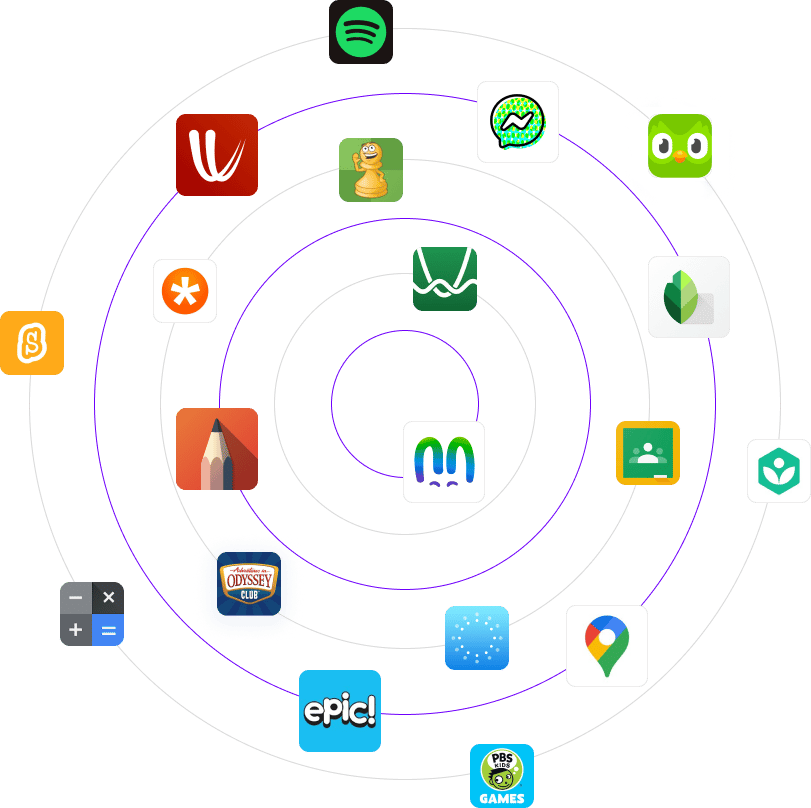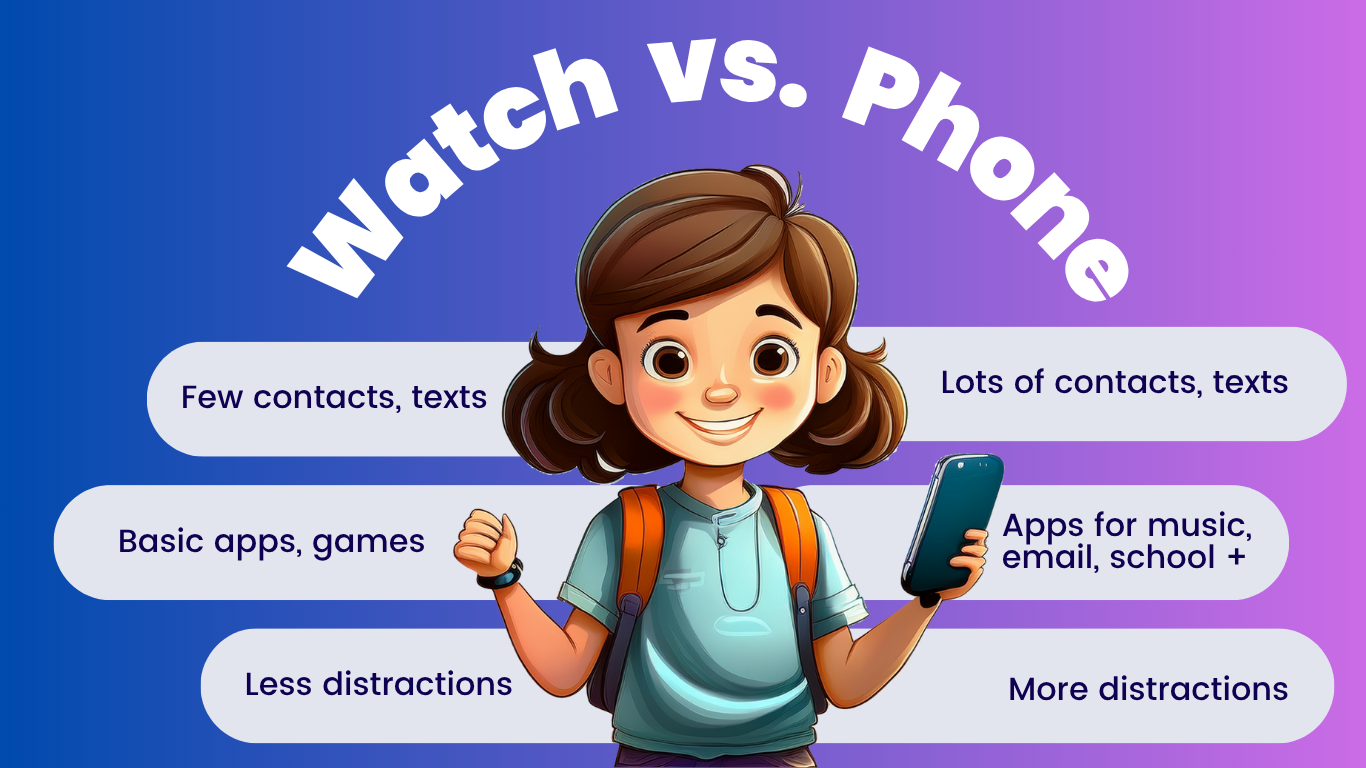
Smart Watch vs. Phone: Which Device is Right for Your Child?
You know your child needs some way to reach you when they're at after-school activities, walking home, or spending time with friends. But the choice between a kid's smart watch or a kid's smartphone feels overwhelming.
You're not alone in this dilemma! This guide will help you decide what makes sense for your family.
Key Considerations
1. Who Will They Call and Text—And How Often?
The first question to ask is how much your child will actually communicate and with whom. Both smart watches and smartphones can include contact safelists to ensure your child only communicates with approved people, but the experience differs significantly.
Simple Communication Needs
If your child mainly needs to reach you, a caregiver, and a few friends with devices, a smart watch handles this beautifully. They can make calls and send basic texts using voice to text without having to enter contact information for a lot of people.
Complex Social Coordination
However, if your child is at the stage where they're making their own social plans—coordinating group projects, arranging playdates, or staying in touch with a wider circle of friends—a smartphone's larger keyboard and fuller messaging features make communication much easier.
Consider: Does your child currently ask to use your phone to text friends or coordinate plans? If yes, they might be ready for their own phone.

2. What apps do they need?
Available apps represent the biggest difference between watches and phones, and this often determines which device makes sense for your child's current life stage.
Limited Apps = Limited Distractions
Smart watches typically offer a very basic set of apps—perhaps a simple game or two, a camera for photos, and basic utilities like a calculator. This limitation is actually a feature for many families because it means less time spent negotiating app downloads and managing screen time boundaries.
More Functionality for Older Kids
Phones open up a world of possibilities that older children often need or want as their independence grows: map apps for navigating to friends' houses, transportation apps for taking the bus, educational apps for school projects, or music streaming. They might also want specific games or video content that simply isn't available on watches.
Think about your child's current requests: Are they asking to download specific apps on your devices? Do they need functionality for school or independent activities? These needs often signal readiness for a phone.

3. How distractible is your child?
Phones, even parent-managed ones, offer many more opportunities for distraction. More apps mean more decisions about what's appropriate, more potential for overuse of on games or videos, and more ongoing conversations about balanced usage. If your child tends to get completely absorbed in digital activities and struggles to stop when asked, a watch's limited functionality might be a blessing.
Managing Boundaries
With a smart watch, you'll still need some boundaries—many kids can get absorbed in watch games just like phone games. But watches have fewer apps to evaluate, fewer features to manage, and generally less potential for the device to take over their attention.
Consider your child's current relationship with screens: Do they have trouble stopping activities when asked? Do they get hyperfocused on games or videos? How much energy do you want to spend on ongoing screen time negotiations?
-Feb-03-2023-01-52-33-5613-AM.png?width=500&height=700&name=Untitled%20design%20(1)-Feb-03-2023-01-52-33-5613-AM.png)
4. How responsible is your child with valuables?
Let's be practical about the financial and logistical realities of giving your child an expensive piece of technology.
The Track Record Test
Think about how your child handles their current belongings. Do they consistently remember their backpack, water bottle, and jacket? Can they keep track of a library book for two weeks? A child who frequently loses important items might benefit from starting with a less expensive smart watch that stays attached to their wrist.
However, if your child has demonstrated good care with valuable items and you expect they'll need a smartphone soon anyway, it might make sense to invest in the device they'll grow into rather than buying both.

5. Navigating social dynamics and peer pressure
One of the most challenging aspects of this decision isn't technical—it's social. Your child's device choice affects how they fit in with their peer group, and this becomes more important as they get older.
Understanding Your Child's Social Environment
Take a realistic look at what devices your child's friends have. In some communities, most elementary schoolers have smart watches, while in others, smartphones are more common even among younger kids. While you shouldn't base your decision entirely on what others do, understanding the social landscape helps you prepare for conversations with your child.
If most of your child's friends have smartphones and your child has a watch, be ready to discuss why your family made this choice. Frame it positively: "We chose a watch because it gives you everything you need right now while you're learning to be responsible with technology." Consider setting clear milestones for when they might be ready for their next device—perhaps when they demonstrate consistent responsibility with their current device, reach a certain age, or show they can handle increased independence.

Making your decision

Remember that this doesn't have to be a permanent choice. Many families start with a smart watch for younger children and transition to a managed smartphone as communication needs grow and responsibility increases. This approach allows children to learn digital responsibility gradually.
The key is matching the device to your child's current needs and maturity level, not what you think they might need in the future or what their friends have.
Questions to Guide Your Choice:
- How much will my child communicate, and with whom?
- What specific apps or functionality do they need for their current activities?
- How much energy do I want to spend on managing screen time and app boundaries?
- How has my child handled responsibility with other valuable items?
- What social pressures am I prepared to navigate?
Next Steps
Whether you choose a smart watch or phone, the most important step is having ongoing conversations with your child about responsible technology use. Set clear expectations, discuss digital citizenship, and regularly check in about how the device is working for your family.
Both smart watches and parent-managed phones can be excellent tools for keeping your family connected while supporting your child's growing independence—when chosen thoughtfully for your unique situation.
Ready to explore your options? Check out Pinwheel's kid-focused smartphones and smart watches designed with families in mind.